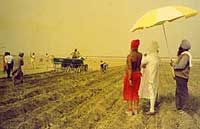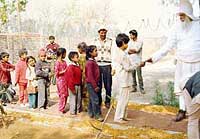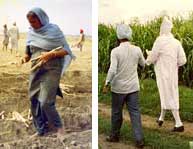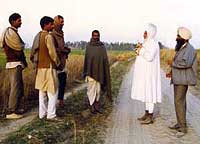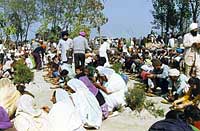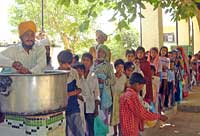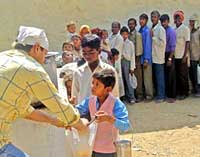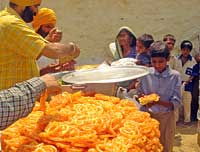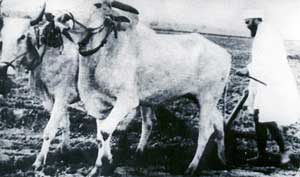 Baba Virsa Singh plows the early fields at Gobind Sadan. Circa 1970
Baba Virsa Singh plows the early fields at Gobind Sadan. Circa 1970
“Poverty is not a permanent state. There is no such class or nation we can call ‘the poor.’ Work hard and thank God and He will lift you out of poverty. That is my personal experience. The policies of the world are wrong – there should be no poverty.”
Baba Virsa Singh
“In my international development career, when working with the poor to help them get out of poverty I have always started with what they had rather with what they needed. It is a self- empowerment approach. The work is worship approach pioneered by Babaji at Gobind Sadan is the spiritual soul mate of my work. My transition to this type of thinking was certainly though subtly influenced through my first encounter with Babaji 14 years ago.”
Dr. Naresh Singh, Exec. Director, UNDP Commission, Legal Empowerment of the Poor.
“The basic goal of all religions is to take those things that are not in productive use—be they land, trees, or the human mind—and help them develop. As part of God’s commitment to the Prophets, God has always commanded them, ‘Go and prosper, and make these minds and lands productive.’ Adam planted wheat; Noah planted grapes; Guru Nanak cultivated the soil with his own hands. God commanded them to make the land productive. This commandment from God continues today. Food is needed for people’s bodies, just as Nam is needed as food for the mind.
Jesus said he would find the lambs who were lagging behind and reunite them with the flock; he would lift the lambs that were lost and carry them to the herd. He was referring to his great love for those who have been rejected by society: ‘I have come for you. You are not going to be lost now.’
Religion does not lie in erecting big edifices as houses for God. God does not have time to sit there being worshipped. Rather, God is here in the world, constantly working with the poor and needy, for the uplift of humanity.
When we erect an elaborate religious building, it simply increases the burden on people and diverts resources from the alleviation of poverty. Instead, if we take barren land and develop it, sow crops there, we can use that income to decrease poverty and help the poor to rise. Our program is to take all of nature that is lying waste, not being used properly, and help reclaim it, for the benefit of all people, regardless of their nationality, creed, or race. Those who love God should always be thinking about what problems exist in their particular areas, and spend their time working to alleviate those problems.
As Guru Amar Das prayed, ‘Oh God the whole world is on fire.’ People are suffering in sorrow and oppression; the environment is suffering. The Guru prayed, ‘Please bless and relieve the suffering of the entire creation. From whatever path people approach you, please bless them.’
I have full faith that if those who preach the word of God would all get involved and begin to work productively again—rather than just sitting idle and taking money for themselves and for big buildings in God’s name—we would be able to overcome many of the current difficulties in the world.
We should all work hard and serve humanity, but keep ourselves out of the picture. We should constantly thank God as the only Doer: ‘Dear Lord, this work that I have done is all your work. I have done nothing. This is all your grace.’ To love God is not to sit idle and say, ‘Oh God, you are responsible for everything.’ Rather, we should work incredibly hard to overcome the difficulties in the world. We should meet every adversity and then pray, ‘Dear Lord, this service and this success are all due to your grace. I have done nothing.’
As one meditates, one becomes aware of everyone’s needs and is always concerned for their well-being. One cares for the poor who work all day but still cannot meet their basic needs. Guru Amar Das has said, ‘Worry about others.’ One continually prays, “Please God, give them food, give them clothing, please make their life easier. And in addition to their physical sustenance, please give them spiritual sustenance too.'”
 Gobind Sadan
Gobind Sadan
